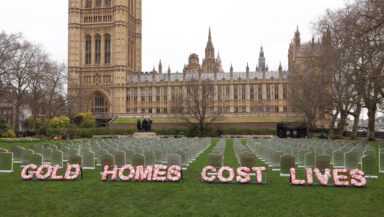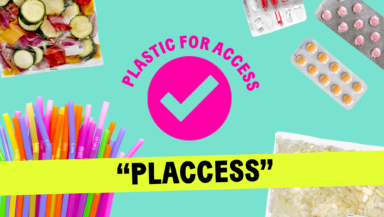Ten Indigenous Leaders from five regions of Brazil delivered a letter and over 200,000-strong petition to Downing Street this morning, calling on the UK government to support their mission to end Indigenous bloodshed.
The letter [1] condemns the serious violations of Indigenous Peoples’ rights since President Bolsonaro took office in January and sets out a series of demands for government. The Greenpeace UK petition [2] asks the government to suspend any trade talks with Brazil until the Amazon and its people are protected.
The Indigenous leaders arrived in London on Wednesday, the 17th city visited on their month-long advocacy tour: Indigenous Blood: Not a Single Drop More organized by APIB, the Association of Indigenous Peoples of Brazil.
Their visit comes less than two weeks after the Indigenous forest guardian Paulo Paulino Guajajara was assassinated in an ambush by five loggers in the Araribóia Indigenous Land (MA) on Friday November 1. On November 3, Funai’s base of protection for isolated indigenous people in the Javari Valley, in the Amazon, was again shot at by hunters and illegal fishermen.
Nara Baré, coordinator of COIAB (Coordination of Indigenous Peoples of the Amazon) said: “What happened to our relative, Paulino Guajajara, is a clear example of what we have been through. Our blood being shed for the soybeans and wood that comes to Europe. Every import that comes to Europe is marked with our blood. It’s time to say enough! Measures need to be taken, and the responsibility lies with everyone: parliaments, civil society, consumers and businessmen themselves.”
This afternoon, the delegation will meet with UK companies including Tesco, Asda, Sainsbury’s, Morrisons, Iceland and the British Retail Consortium to discuss the impact soya grown for animal feed is having on Brazil’s forests, Indigenous lives and protected areas. Burger King, KFC and McDonald’s were invited to the meeting, organised by Greenpeace, but declined to attend, as did UK meat giants 2 Sisters Food Group, Moy Park and Avara Foods, some of the biggest users of soya.
Richard George, Greenpeace UK head of forests, said: “It’s inexcusable that some of the UK’s biggest users of soya for animal feed and meat production like Burger King, KFC and McDonald’s have turned down the opportunity to speak directly to the Indigenous Leaders here today. The overconsumption of companies like these is jeopardising any hope of protecting the rights of Indigenous Peoples or preventing climate breakdown. Companies and the UK government have a responsibility to listen and act or we will all suffer the consequences.”
Yesterday, the leaders protested outside the Brazilian Embassy with Survival International, handing over the organisation’s ‘Racist of the Year’ award to the embassy for Brazil’s President Bolsonaro.
PHOTOS from the Downing Street petition hand in: https://media.greenpeace.org/collection/27MZIFJ8R7SEK
ENDS
Notes to Editors
Photos of the tour can be found here (the link will be updated as soon as new images are available): https://media.greenpeace.org/collection/27MZIFJ8FRG7C
[1] The letter to UK Government can be found here: https://docs.google.com/document/d/1gTiX0BUAvmi2dAY-jJ0j5GiuTK8esNFaLtc0i6h8wMQ/edit
[2] The Greenpeace UK petition is here: https://secure.greenpeace.org.uk/page/s/uk-government-no-trade-deal-with-brazil-until-the-amazon-fires-are-out
The Advocacy tour
Since October 17, the indigenous leaders have toured eight European countries (Italy, Germany, Sweden, Norway, the Netherlands, Belgium, Switzerland and France), attending hearings with government authorities including Prime Minister Mark Rutte of the Netherlands; Ola Elvestuen, Norwegian Minister of Climate and Environment; Niels Annen, Deputy Foreign Minister of Germany, and several parliamentarians. At the meetings, they defended the non-ratification of the Mercosur-EU agreement under its current terms. The delegation also proposed the establishment of European Union policies to ensure transparency and traceability in the purchase of Brazilian products, and the prohibition and punishment, as well as to prevent the predatory exploitation of indigenous territories.
The delegation filed denunciations against the Brazilian government at the International Court of Justice in the Hague regarding the attacks on indigenous rights in Brazil since the inauguration of Jair Bolsonaro as president.
APIB goals
Report the serious violations perpetrated against indigenous peoples and the environment in Brazil, which have been systematically occurring since the inauguration of President Jair Bolsonaro in January of this year, aimed at combating misinformation and the spread of fake news.
Promote measures that pressure the Brazilian government and agribusiness companies to comply with environmental preservation agreements and respect for the rights of indigenous peoples to which Brazil is a signatory, such as the Paris Agreement, Convention 169 – which guarantees Free Consultation, Prior and Informed – and the UN Declaration on the Rights of Indigenous Peoples, the New York Declaration, Consumers Good Forum and many other commitments.
Sensitise people from different countries to demand that their governments take measures that pressure the Brazilian government and agribusiness companies to comply with environmental preservation agreements and respect the rights of indigenous peoples, to which Brazil is a signatory.
That European consumers, businesses, and governments should not promote commodity production coming from deforestation, social conflicts, land grabbing, the exploitation of slave labor, and the rampant use of pesticides that pollute our soil and our rivers.
To demand advances in international legislation based on the Universal Declaration of the Rights of Mother Nature as per the 2010 People’s Agreement of Cochabamba (People’s Accord), signed in Cochabamba, Bolivia.
That international bodies recognize the crime of ecocide as a crime against humanity and that all those who have deforested, polluted or killed rivers, lakes and oceans are punished.
Educate, promote, and connect an international network of people and organisations that support the defense of the environment and the rights of indigenous peoples in Brazil.
To make European consumers aware of conscious consumption habits.



